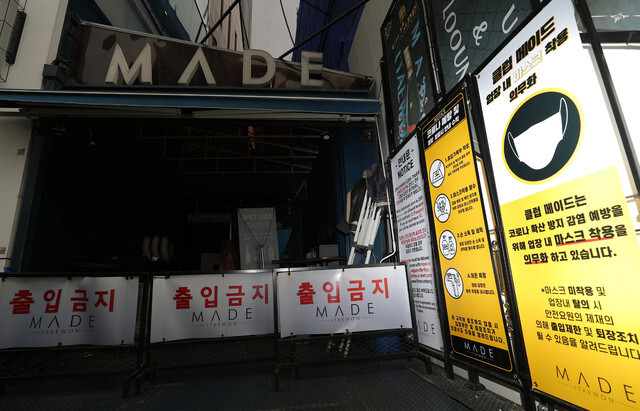hankyoreh
Links to other country sites 다른 나라 사이트 링크
[News analysis] Comparing the Itaewon club outbreak with Shincheonji

A club in Seoul’s Itaewon neighborhood recently visited by a COVID-19 patient remains closed on May 12. (Lee Jong-keun, staff photographer)A week after an infection cluster tied to clubs in Seoul’s Itaewon neighborhood was identified on May 7, the number of associated new novel coronavirus patients diagnosed has remained in the range of 20 to 40 per day. The level is unexpectedly low compared to expectations of another “superspreading” situation like infection clusters that erupted around the Shincheonji religious sect in Daegu -- but disease prevention authorities explained on May 13 that the difference between the Itaewon club patrons and Shincheonji members is the latter “repeatedly engaged in high-density contact.”
At a regular briefing that afternoon, the Korea Centers for Disease Control and Prevention (KCDC) Director Jung Eun-kyeong was asked about the relative risks of the Itaewon club clusters compared with the Shincheonji case.
“The two-week incubation period [since the first patient] hasn’t yet passed, and there are still people who haven’t been tested, so we’ll only be able to reach a conclusion on the precise infection rate and risk once the investigation is complete,” she cautioned.
At the same time, she noted that there “may be differences in terms of the infection rate.”
“In the case of Shincheonji members, there were a large number of small gatherings involving people in close contact in addition to the church services,” she said.
According to this explanation, the opportunities for virus transmission increase when a set group of people hold ongoing meetings within a church -- unlike clubs, where unspecified numbers of people stay for a few minutes to a few hours at most before moving on to another place. Indeed, following the first diagnosis of a coronavirus patient in Daegu with Patient No. 31, the numbers of new cases associated with Shincheonji surged the following day, climbing to the dozens and hundreds on a daily basis, peaking at 851 on Mar. 3.
Jung also noted similarities between the two cases.
“At the same, people may not have worn masks because there hadn’t been any risk [of virus transmission] or community infections, and they appear likely to have been heavily exposed to droplets while praying or observing services,” she explained.
“Similarly, club visitors did not wear masks indoors, and they released a lot of droplets through things like shouting,” she continued.
“It doesn’t necessarily have to be Shincheonji or a club -- [transmission] can occur anywhere when you have this kind of enclosed space with very high density and closeness,” she stressed.
As a measure to improve efficacy and disease prevention in densely crowded and poorly ventilated settings, disease control authorities are currently weighing whether to invoke an administrative order barring people from entering false information when filling out a visitor log at clubs and other establishments. They also plan to beef up protection guidelines based on the risks associated with particular facilities.
“Nightlight establishments, after-school academies, and public schools all carry different risks, and I 100% agree with the idea that we need a differentiated approach,” Jung said, adding that disease control authorities “plan to consider whether we need legal grounding, incentives, differentiation, and so forth.”
Meanwhile, the anonymous testing that was being provided by local governments in Seoul, Gangnam, and elsewhere was expanded nationally as of May 13. Disease control authorities explained that this was a “measure reflecting the particularity of the Itaewon club [situation]” and that they “do not plan to expand this into full-scale testing.”
By Cho Hye-jeong, staff reporter
Please direct comments or questions to [english@hani.co.kr]

Editorial・opinion
![[Column] Season 2 of special prosecutor probe may be coming to Korea soon [Column] Season 2 of special prosecutor probe may be coming to Korea soon](https://flexible.img.hani.co.kr/flexible/normal/500/300/imgdb/original/2024/0426/3317141030699447.jpg) [Column] Season 2 of special prosecutor probe may be coming to Korea soon
[Column] Season 2 of special prosecutor probe may be coming to Korea soon![[Column] Park Geun-hye déjà vu in Yoon Suk-yeol [Column] Park Geun-hye déjà vu in Yoon Suk-yeol](https://flexible.img.hani.co.kr/flexible/normal/500/300/imgdb/original/2024/0424/651713945113788.jpg) [Column] Park Geun-hye déjà vu in Yoon Suk-yeol
[Column] Park Geun-hye déjà vu in Yoon Suk-yeol- [Editorial] New weight of N. Korea’s nuclear threats makes dialogue all the more urgent
- [Guest essay] The real reason Korea’s new right wants to dub Rhee a founding father
- [Column] ‘Choson’: Is it time we start referring to N. Korea in its own terms?
- [Editorial] Japan’s rewriting of history with Korea has gone too far
- [Column] The president’s questionable capacity for dialogue
- [Column] Are chaebol firms just pizza pies for families to divvy up as they please?
- [Column] Has Korea, too, crossed the Rubicon on China?
- [Correspondent’s column] In Japan’s alliance with US, echoes of its past alliances with UK
Most viewed articles
- 1AI is catching up with humans at a ‘shocking’ rate
- 2Korea’s 1.3% growth in Q1 signals ‘textbook’ return to growth, says government
- 3[Column] Park Geun-hye déjà vu in Yoon Suk-yeol
- 4No good, very bad game for Korea puts it out of Olympics for first time since 1988
- 5[Column] Season 2 of special prosecutor probe may be coming to Korea soon
- 6[Column] Has Korea, too, crossed the Rubicon on China?
- 7Division commander ordered troops to enter raging flood waters before Marine died, survivor says
- 8Is Japan about to snatch control of Line messenger from Korea’s Naver?
- 9Marriages nosedived 40% over last 10 years in Korea, a factor in low birth rate
- 101 in 5 unwed Korean women want child-free life, study shows